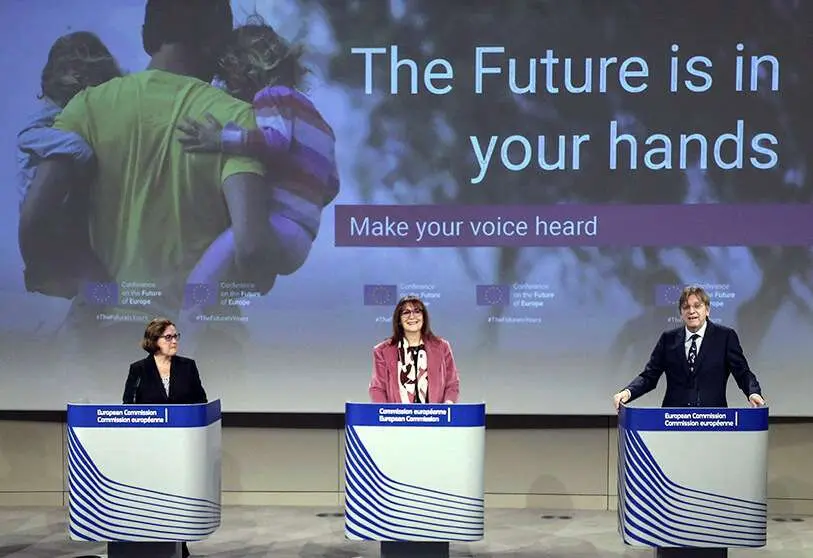After COVID-19, the future of the Union lies in the Conference on the Future of Europe

After a year's delay due to COVID-19 and the differences between the institutions, especially over the figure of Guy Verhofstadt, the Conference on the Future of Europe (CoFoE) was convened on 10 March by the three presidents of the institutions, the European Parliament, the Council of the EU and the European Commission. The aim of this conference is to discuss and make proposals between the representatives of the institutions, civil society and citizens, with a view to improving the functioning of the European Union and, if necessary, reforming the Union, in order to guarantee, in the medium term, the well-being of citizens and the development of their citizenship and their rights.
As a result of the pandemic that arrived a year ago, the European Union, by means of its institutions, has adopted commitments of federal scope that were not expected and which are producing very considerable progress, not only from a health point of view but also in terms of dealing with the economic and social crisis that has accompanied it; despite the initial delay of three weeks of confusion in which each government of each State was going its own way.
Specifically, I am referring to the Recovery Plan and the European New Generations Fund, which involve a federal advance as the distribution of the fund is done on the basis of needs and not in relation to an intergovernmental logic that would be based on the percentage of population or GDP. This means that, of the 750 billion euros, Spain will receive 140 billion euros and Italy 210 billion euros because they were the countries that suffered the most during the first wave of the pandemic. While the Netherlands, which has a GDP similar to Spain's, will receive only 3.5 billion euros.

The way in which this financing is obtained is also federal, as it is done through a joint loan from the European Union as a whole, and not through the member states. The intervention of the European Central Bank has also been federal, releasing all the necessary funding at minuscule interest rates with hardly any quid pro quo. In the same vein, I also understand that the near duplication of the Multiannual Financial Framework and decisions on the purchase and distribution of vaccines is federal.
In the light of this reality, the Conference on the Future of Europe puts forward the necessary proposals to ensure that these de facto decisions are converted into a de jure' articulation in which, in the future, it is guaranteed that, through an extension of competences and a reform of the institutions, these advances that consolidate the welfare society and citizens' rights can continue.
The conference will last just under a year, starting on 9 May 2021 and ending in spring 2022, because the French Presidency wants to have proposals before the French presidential elections in the spring. I believe that this shortening of the Conference from two years to less than one is in the interests of Europe, certainly in the interests of France, but possibly also in the interests of Spain, as this will mean that the Spanish Presidency in the second half of 2023 will be the time when the reform of the treaties will be completed.

We hope that in the composition of the CoFoE there will be a balance between representatives of the institutions and those of civil society on an equal footing, as pointed out by the President of the Commission, Ursula von der Leyen, in her investiture speech in the European Parliament on 17 June 2019. Also including the social partners, citizens and with the special participation of young people, as reflected in the call, since the aim of this is to listen to their proposals and, between both sensibilities, propose reforms that consolidate a European Union that is closer to the citizens.
We agree with the Interinstitutional Declaration of 10 March on the Conference on the Future of Europe, which states that a new space for debate with citizens will be opened up to address Europe's challenges and priorities, that European citizens from all walks of life and from all corners of the Union will be able to participate, and that young Europeans will play a central role in shaping the future of the European project.
Francisco Aldecoa Luzárraga
President of the Spanish Federal Council of the European Movement
Professor of International Relations at the Complutense University of Madrid.

